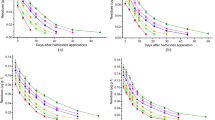Abstract
In semi-arid regions wastewater irrigation is a valuable resource for agricultural production. The contamination of irrigated soils with surfactants is one of the ecological risks related to irrigating with untreated wastewater. In this study, the effects of branched alkylbenzene sulfonates (ABS) on microbial biomass, respiratory activity, and denitrification capacity of soil samples (eutric vertisols) taken from an irrigation district in the Mexico City area were investigated in laboratory experiments. Increasing concentrations of ABS lead to a decrease in soil microbial biomass and an increase in soil respiratory activity as well as in the metabolic quotient (qCO2) of the soils. Denitrification capacity was lowest without the addition of ABS and highest at a medium ABS concentration of 50 μg g–1. Denitrification capacity seems to be highly sensitive to ABS addition at moderate concentrations. From the laboratory results, high rates of denitrification and N2O evolution from fields irrigated with wastewater containing ABS are expected.
Similar content being viewed by others
Author information
Authors and Affiliations
Additional information
Received: 11 November 1997
Rights and permissions
About this article
Cite this article
Friedel, J., Langer, T., Rommel, J. et al. Increase in denitrification capacity of soils due to addition of alkylbenzene sulfonates. Biol Fertil Soils 28, 397–402 (1999). https://doi.org/10.1007/s003740050511
Issue Date:
DOI: https://doi.org/10.1007/s003740050511




